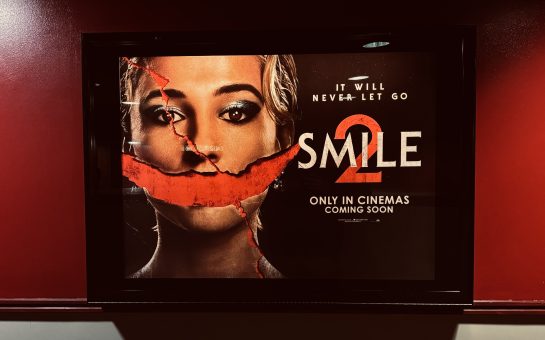Stutterer is a beautiful romance that sheds the clichéd tropes of the genre to produce something poignant, wonderful and genuine.
The world is a big place when you have to fit it all inside your head.
Without an outlet, all the thoughts and knowledge acquired in life simply build, cramping the mind like lactic acid.
This is the life of Stutterer’s protagonist, Greenwood – a man of great imagination and eloquence, trapped inside his own head by a crippling stammer.
The film opens with Greenwood, played by Matthew Needham, alone in a darkened room, grappling with the daunting task of what for most would be a routine enquiry about an internet bill.
For Greenwood, the task of verbal interaction is a fearful and embarrassing task to undergo.
Throughout the film, we see how the power that Greenwood’s anxieties hold over him and how he has largely accepted his isolation – choosing to pretend to be deaf in order to avoid replying to simple requests in the street.
The irony is apparent.
Greenwood, a typographer by trade, lives in a house where stacks of books line the walls.
Almost every inch of his existence is surrounded by words, yet communication is an endless struggle.
Wonderful news on the Oscar Win for @stuttererfilm – an absolutely beautiful short film. https://t.co/73eXkMgsQm
— Nadia Molinari (@Nadia_Molinari) February 29, 2016
Greenwood possesses clear creativity and intelligence, but is denied independence by his stutter, which has infected his self-confidence giving rise to seemingly terminal self-doubt and intense self-loathing.
For Greenwood, there is but one escape from his head – Ellie, a girl he has engaged in an online relationship with for six months.
Conversations with Ellie, played by Chloe Pirrin, are moments of fleeting bliss for Greenwood, who, despite his social isolation, has built a relationship with the depth that many of those around him may never experience.
Greenwood’s love for Ellie resembles a kind of adoration of the mythical.
His love is tangible, yet oddly she is not.
These scenes, where a smile beams uncontrollably across Greenwood’s face, contrast powerfully with those surrounding them as Benjamin Cleary’s clever direction and careful framing ensure that Greenwood remains ever-separate from the world around him.
Even the somewhat close relationship he has with his father, played by Eric Richards, bears subtle signs of distance represented by the constant physical separation of the two.
When Ellie tells Greenwood she will be visiting in London and asks to meet, Greenwood’s initial reaction is panic.
He stiffens upon seeing Ellie’s message, held back by anxiety and fear, shutting the laptop without reply.
Ultimately, after much deliberation and nervous sweating, Greenwood defies his anxieties and the two agree to meet.
Thousands of bottled insecurities spill over one another as Greenwood’s self-doubt threatens to take hold, but, not knowing what to say or how he is going to say it, he somehow perseveres.
However, upon first sight, words become irrelevant and Greenwood’s insecurities finally fall silence.
As Nico Casal’s wonderful piano piece swells, Greenwood’s anxieties continue to fade and he allows himself to truly feel an emotion without attempt to undermine it with a self-aware sense of fear and loathing.
Ellie shifts excitedly and it is clear that she has found in him as much solace as he has in her.
His world wraps around her and hers around him.
Ben and his younger brother Ollie are on the #redcarpert at the #Oscars! pic.twitter.com/w6rzyjxr9K
— S T U T T E R E R (@stuttererfilm) February 28, 2016
This final scene is an excellent example of how a film with as little spoken dialogue as Stutterer manages to express so much.
More is said in the silence than any words could.
The actors’ expressive portrayals, the beautifully simple camera work and the delightful premise give life to the film and are what make it so special.
Brilliantly crafted and a deserved Oscar winner, Stutterer is an ode to the importance of human contact that doesn’t avoid the darker aspects of what this entails.
Image courtesy of Ben Cleary, via YouTube, with thanks



